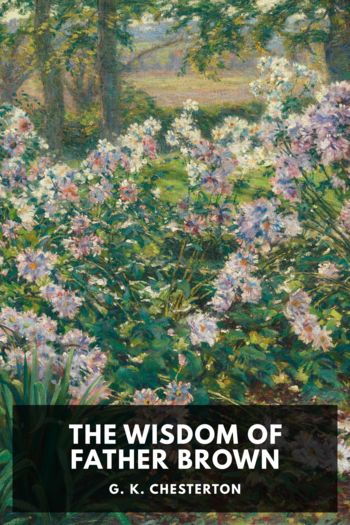The Wisdom of Father Brown - G. K. Chesterton (read full novel .txt) 📗

- Author: G. K. Chesterton
Book online «The Wisdom of Father Brown - G. K. Chesterton (read full novel .txt) 📗». Author G. K. Chesterton
The line of the sea looked frozen in the very vividness of its violet-blue, like the vein of a frozen finger. For miles and miles, forward and back, there was no breathing soul, save two pedestrians, walking at a brisk pace, though one had much longer legs and took much longer strides than the other.
It did not seem a very appropriate place or time for a holiday, but Father Brown had few holidays, and had to take them when he could, and he always preferred, if possible, to take them in company with his old friend Flambeau, ex-criminal and ex-detective. The priest had had a fancy for visiting his old parish at Cobhole, and was going northeastward along the coast.
After walking a mile or two farther, they found that the shore was beginning to be formally embanked, so as to form something like a parade; the ugly lampposts became less few and far between and more ornamental, though quite equally ugly. Half a mile farther on Father Brown was puzzled first by little labyrinths of flowerless flowerpots, covered with the low, flat, quiet-coloured plants that look less like a garden than a tessellated pavement, between weak curly paths studded with seats with curly backs. He faintly sniffed the atmosphere of a certain sort of seaside town that he did not specially care about, and, looking ahead along the parade by the sea, he saw something that put the matter beyond a doubt. In the grey distance the big bandstand of a watering-place stood up like a giant mushroom with six legs.
“I suppose,” said Father Brown, turning up his coat-collar and drawing a woollen scarf rather closer round his neck, “that we are approaching a pleasure resort.”
“I fear,” answered Flambeau, “a pleasure resort to which few people just now have the pleasure of resorting. They try to revive these places in the winter, but it never succeeds except with Brighton and the old ones. This must be Seawood, I think—Lord Pooley’s experiment; he had the Sicilian Singers down at Christmas, and there’s talk about holding one of the great glove-fights here. But they’ll have to chuck the rotten place into the sea; it’s as dreary as a lost railway-carriage.”
They had come under the big bandstand, and the priest was looking up at it with a curiosity that had something rather odd about it, his head a little on one side, like a bird’s. It was the conventional, rather tawdry kind of erection for its purpose: a flattened dome or canopy, gilt here and there, and lifted on six slender pillars of painted wood, the whole being raised about five feet above the parade on a round wooden platform like a drum. But there was something fantastic about the snow combined with something artificial about the gold that haunted Flambeau as well as his friend with some association he could not capture, but which he knew was at once artistic and alien.
“I’ve got it,” he said at last. “It’s Japanese. It’s like those fanciful Japanese prints, where the snow on the mountain looks like sugar, and the gilt on the pagodas is like gilt on gingerbread. It looks just like a little pagan temple.”
“Yes,” said Father Brown. “Let’s have a look at the god.” And with an agility hardly to be expected of him, he hopped up on to the raised platform.
“Oh, very well,” said Flambeau, laughing; and the next instant his own towering figure was visible on that quaint elevation.
Slight as was the difference of height, it gave in those level wastes a sense of seeing yet farther and farther across land and sea. Inland the little wintry gardens faded into a confused grey copse; beyond that, in the distance, were long low barns of a lonely farmhouse, and beyond that nothing but the long East Anglian plains. Seawards there was no sail or sign of life save a few seagulls: and even they looked like the last snowflakes, and seemed to float rather than fly.
Flambeau turned abruptly at an exclamation behind him. It seemed to come from lower down than might have been expected, and to be addressed to his heels rather than his head. He instantly held out his hand, but he could hardly help laughing at what he saw. For some reason or other the platform had given way under Father Brown, and the unfortunate little man had dropped through to the level of the parade. He was just tall enough, or short enough, for his head alone to stick out of the hole in the broken wood, looking like St. John the Baptist’s head on a charger. The face wore a disconcerted expression, as did, perhaps, that of St. John the Baptist.
In a moment he began to laugh a little. “This wood must be rotten,” said Flambeau. “Though it seems odd it should bear me, and you go through the weak place. Let me help you out.”
But the little priest was looking rather curiously at the corners and edges of the wood alleged to be rotten, and there was a sort of trouble on his brow.
“Come along,” cried Flambeau impatiently, still with his big brown hand extended. “Don’t you want to get out?”
The priest was holding a splinter of the broken wood between his finger and thumb, and did not immediately reply. At last he said thoughtfully: “Want to get out? Why, no. I rather think I want to get in.” And he dived into the darkness under the wooden floor so abruptly as to knock off his big curved clerical hat and leave it lying on the boards above, without any clerical head





Comments (0)